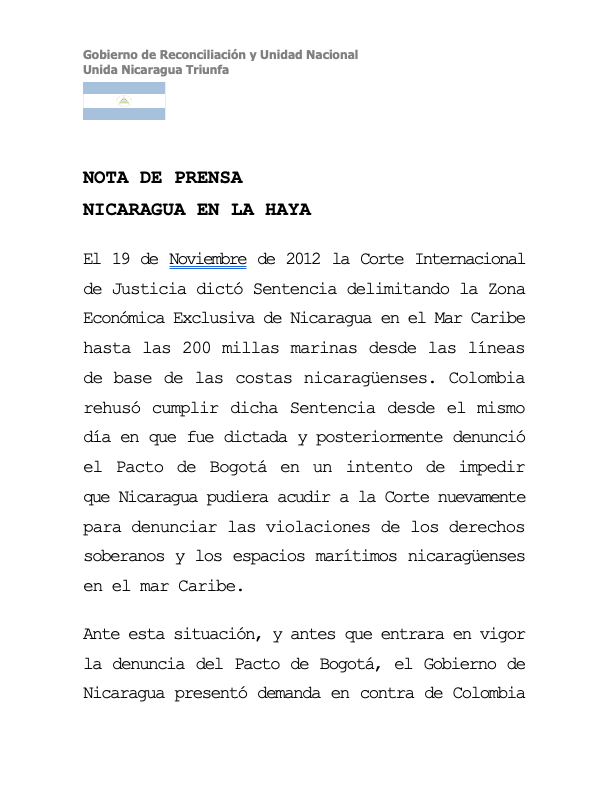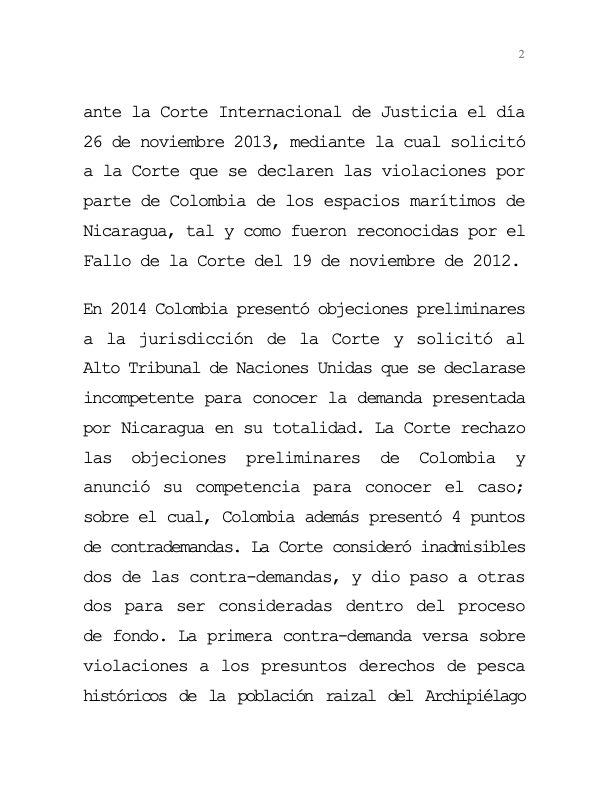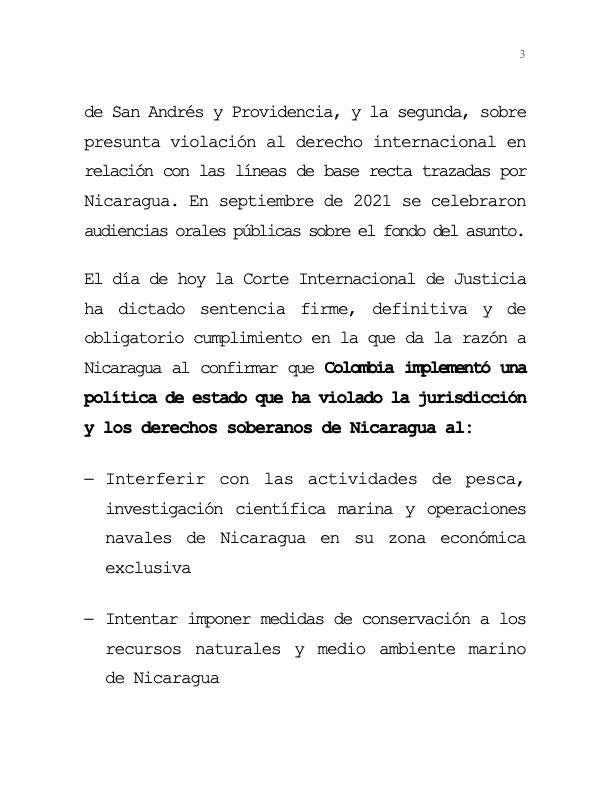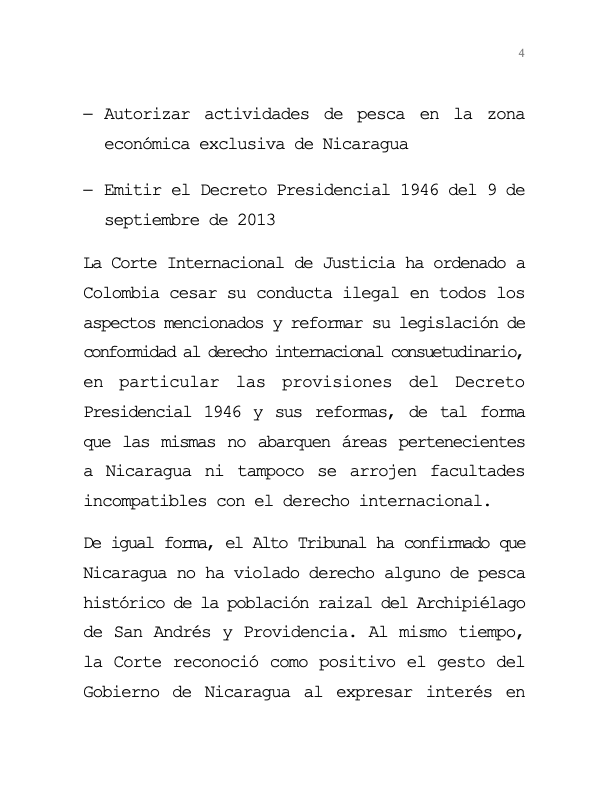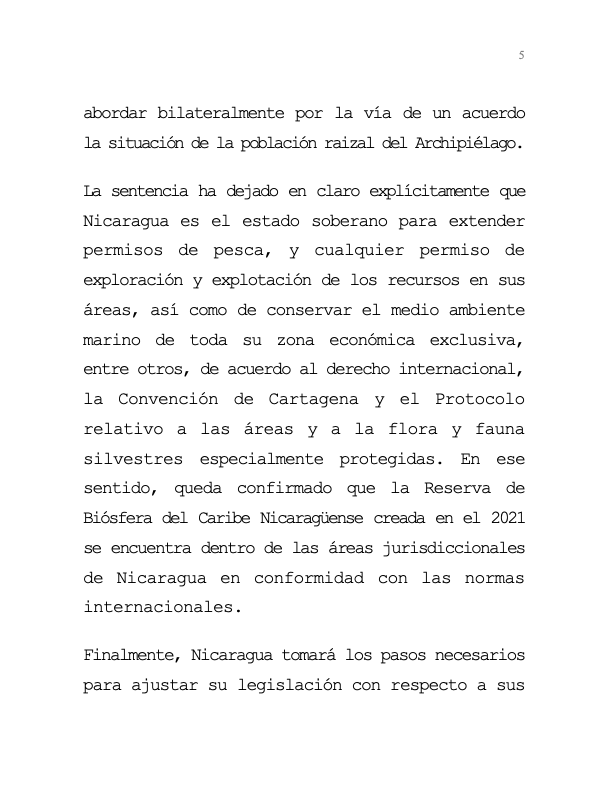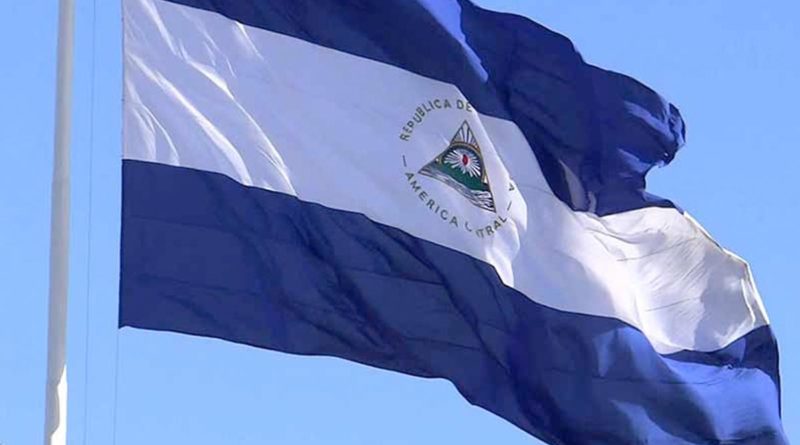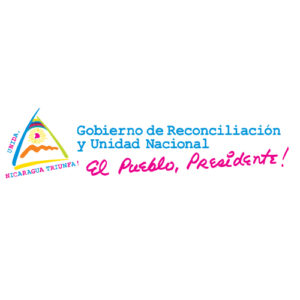A continuación, la nota de prensa íntegra del Gobierno de Nicaragua:
Gobierno de Reconciliación y Unidad Nacional
Unida Nicaragua Triunfa
NOTA DE PRENSA
NICARAGUA EN LA HAYA
El 19 de Noviembre de 2012 la Corte Internacional de Justicia dictó Sentencia delimitando la Zona Económica Exclusiva de Nicaragua en el Mar Caribe hasta las 200 millas marinas desde las líneas de base de las costas nicaragüenses. Colombia rehusó cumplir dicha Sentencia desde el mismo día en que fue dictada y posteriormente denunció el Pacto de Bogotá en un intento de impedir que Nicaragua pudiera acudir a la Corte nuevamente para denunciar las violaciones de los derechos soberanos y los espacios marítimos nicaragüenses en el mar Caribe.
Ante esta situación, y antes que entrara en vigor la denuncia del Pacto de Bogotá, el Gobierno de Nicaragua presentó demanda en contra de Colombia ante la Corte Internacional de Justicia el día 26 de noviembre 2013, mediante la cual solicitó a la Corte que se declaren las violaciones por parte de Colombia de los espacios marítimos de Nicaragua, tal y como fueron reconocidas por el Fallo de la Corte del 19 de noviembre de 2012.
En 2014 Colombia presentó objeciones preliminares a la jurisdicción de la Corte y solicitó al Alto Tribunal de Naciones Unidas que se declarase incompetente para conocer la demanda presentada por Nicaragua en su totalidad. La Corte rechazo las objeciones preliminares de Colombia y anunció su competencia para conocer el caso; sobre el cual, Colombia además presentó 4 puntos de contrademandas. La Corte consideró inadmisibles dos de las contra-demandas, y dio paso a otras dos para ser consideradas dentro del proceso de fondo. La primera contra-demanda versa sobre violaciones a los presuntos derechos de pesca históricos de la población raizal del Archipiélago de San Andrés y Providencia, y la segunda, sobre presunta violación al derecho internacional en relación con las líneas de base recta trazadas por Nicaragua. En septiembre de 2021 se celebraron audiencias orales públicas sobre el fondo del asunto.
El día de hoy la Corte Internacional de Justicia ha dictado sentencia firme, definitiva y de obligatorio cumplimiento en la que da la razón a Nicaragua al confirmar que Colombia implementó una política de estado que ha violado la jurisdicción y los derechos soberanos de Nicaragua al:
- Interferir con las actividades de pesca, investigación científica marina y operaciones navales de Nicaragua en su zona económica exclusiva
- Intentar imponer medidas de conservación a los recursos naturales y medio ambiente marino de Nicaragua
- Autorizar actividades de pesca en la zona económica exclusiva de Nicaragua
- Emitir el Decreto Presidencial 1946 del 9 de septiembre de 2013
La Corte Internacional de Justicia ha ordenado a Colombia cesar su conducta ilegal en todos los aspectos mencionados y reformar su legislación de conformidad al derecho internacional consuetudinario, en particular las provisiones del Decreto Presidencial 1946 y sus reformas, de tal forma que las mismas no abarquen áreas pertenecientes a Nicaragua ni tampoco se arrojen facultades incompatibles con el derecho internacional.
De igual forma, el Alto Tribunal ha confirmado que Nicaragua no ha violado derecho alguno de pesca histórico de la población raizal del Archipiélago de San Andrés y Providencia. Al mismo tiempo, la Corte reconoció como positivo el gesto del Gobierno de Nicaragua al expresar interés en abordar bilateralmente por la vía de un acuerdo la situación de la población raizal del Archipiélago.
La sentencia ha dejado en claro explícitamente que Nicaragua es el estado soberano para extender permisos de pesca, y cualquier permiso de exploración y explotación de los recursos en sus áreas, así como de conservar el medio ambiente marino de toda su zona económica exclusiva, entre otros, de acuerdo al derecho internacional, la Convención de Cartagena y el Protocolo relativo a las áreas y a la flora y fauna silvestres especialmente protegidas. En ese sentido, queda confirmado que la Reserva de Biósfera del Caribe Nicaragüense creada en el 2021 se encuentra dentro de las áreas jurisdiccionales de Nicaragua en conformidad con las normas internacionales.
Finalmente, Nicaragua tomará los pasos necesarios para ajustar su legislación con respecto a sus líneas de base recta en el Mar Caribe para que las mismas puedan cumplir a cabalidad con las recomendaciones del Alto Tribunal.
El Gobierno de Reconciliación y Unidad Nacional reafirma su firme compromiso con el Estado de Derecho a Nivel Internacional y la solución pacífica de las controversias entre los Estados. En particular, Nicaragua desea hacer notar que nuestro recurso al más alto Tribunal de Justicia, y la reiterada presencia de Nicaragua ante dicho Tribunal desde el año de 1984, es una muestra palpable de ese compromiso.
Managua, 21 de Abril 2022
Daniel Ortega Saavedra Rosario Murillo
A continuación, la nota de prensa en su versión en inglés.
Government of Reconciliation and National Unity
United Nicaragua Triumphs
PRESS RELEASE
NICARAGUA IN THE HAGUE
On 19th November, 2012, the International Court of Justice issued a Ruling delimiting the Exclusive Economic Zone of Nicaragua in the Caribbean Sea, up to 200 nautical miles from the baselines of the Nicaraguan coasts. Colombia refused to comply with this ruling from the very day it was issued and subsequently denounced the Pact of Bogotá, in an attempt to prevent Nicaragua from returning to Court, to denounce the violations of Nicaraguan sovereign rights and maritime spaces in the Caribbean Sea.
Faced with this situation, and before the denunciation of the Pact of Bogotá had entered into effect, the Government of Nicaragua presented its claim against Colombia before the International Court of Justice, on 26th November, 2013, requesting that the Court declare the violations committed by Colombia of the maritime spaces of Nicaragua, as recognized by the Court’s ruling of 19th November 2012.
In 2014, Colombia presented preliminary objections to the jurisdiction of the Court and requested that the High Court of the United Nations declare its incapacity to hear the claim filed by Nicaragua in its entirety. The Court rejected Colombia’s preliminary objections and announced its jurisdiction to hear the case; based upon which, Colombia also presented 4 counterclaims. The Court considered two of the counterclaims to be inadmissible, and gave way to another two, to be considered within the deliberation process. The first counter-claim addresses alleged violations of the historical fishing rights of the Raizal population of the Archipelago of San Andrés and Providence, and the second; alleged violations of international law in relation to the straight baselines drawn by Nicaragua. Public oral hearings on the merits of the matter were held on September 2021.
Today, the International Court of Justice has issued a firm, final and mandatory judgment in which it agrees with Nicaragua, by confirming that Colombia implemented a State policy that has violated the jurisdiction and sovereign rights of Nicaragua by:
- Interfering with fishing activities, marine scientific research and naval operations of Nicaragua, in its exclusive economic zone.
- Attempting to impose conservation measures on the natural resources and marine environment of Nicaragua.
- Authorizing fishing activities in the exclusive economic zone of Nicaragua.
- Issued Presidential Decree 1946 of 9th September, 2013.
The International Court of Justice has ordered Colombia to cease its illegal conduct in all the aforementioned aspects and to reform its legislation in accordance with customary international law, in particular the provisions of Presidential Decree 1946 and its amendments, in such a manner that they do not cover areas belonging to Nicaragua or provide faculties that are incompatible with international law.
Similarly, the High Court has confirmed that Nicaragua has not violated any historical fishing rights of the Raizal population of the Archipelago of San Andrés and Providence. At the same time, the Court recognized as a positive gesture of the Government of Nicaragua, its expressed interest in bilaterally addressing, through an agreement, the situation of the Raizal population of the Archipelago.
The ruling has made it explicitly clear that Nicaragua is the sovereign state that issues fishing permits, as well as any other permit for exploration and exploitation of resources in its areas, as well as to conserve the marine environment of its entire exclusive economic zone, among others, in accordance with international law, the Cartagena Convention and the Protocol related to specially protected areas and wild flora and fauna. In this sense, it is confirmed that the Nicaraguan Caribbean Biosphere Reserve, created in 2021, is within the jurisdictional areas of Nicaragua, in accordance with international standards.
Finally, Nicaragua will take the necessary steps to adjust its legislation with respect to its straight baselines on the Caribbean Sea, so that they can fully comply with the recommendations of the High Court.
The Government of Reconciliation and National Unity reaffirms its steadfast commitment to the rule of law at the international level and the peaceful settlement of disputes between states. In particular, Nicaragua wishes to point out that our recourse to the highest Court of Justice, and Nicaragua’s repeated presence before said Court since 1984, is a palpable sign of that commitment.
Managua, 21st April, 2022
Daniel Ortega Saavedra Rosario Murillo
